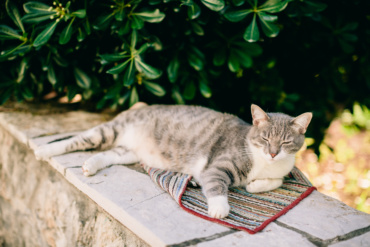Article originally published on The Spruce Pets by Amy Shojai, CABC. Refer to the original article here.
Understanding and Preventing Feline Cognitive Disorder in the Senior Cat
Old cat behavior can be due to senility, technically called Feline Cognitive Dysfunction. Signs of kitty senility can be vague and confusing, and mimic other disease or behavior conditions such as feline separation anxiety or petting aggression. These kitties, usually over the age of fifteen, often develop litter box problems.
In the past, these symptoms would have been brushed off as a normal part of aging, but feline cognitive dysfunction is a medical condition. Cats with cognitive dysfunction develop a starch-like waxy protein deposit (beta amyloid) in the brain. This affects pet cats in the same way that Alzheimer’s disease affects people.
Affected pets typically seem to forget how to do normal activities. Look for:
Disorientation
- Wanders aimlessly
- Acts lost and confused
- Doesn’t recognize familiar people or places
- Gets “stuck” in corners
- Becomes lost in the house
Interaction Changes
- No longer greets family members
- Avoids or dislikes petting
- Loses interest in getting attention
- Interaction changes with other pets
Sleep Changes
- Awake and active at night
- Sleep cycles are disrupted or reversed
House Soiling
- Litter box training is forgotten
- Can’t find the litter box
- Doesn’t know what to do once in the box
Anxiety, Fear, or Compulsive Behaviors
- Suffers tremors
- Yowls and cries for no discernible reason
- Repetitive pacing
- Licks the floor or objects
Treating Old Cat Senility
Sadly, cognitive dysfunction in our pets can’t be cured. Some cats can be helped, at least temporarily, with drug therapy. The drug selegiline hydrochloride (brand name Anipryl) is FDA-approved to treat cognitive dysfunction in dogs. Veterinary behaviorists Dr. Benjamin Hart, Dr. Kelly Moffat, Dr. Gary Landsberg, and others researched feline cognitive dysfunction and found that Anipryl also helped some cats suffering from feline senility.
About a third of cats don’t benefit from the drug, but another third do show modest improvement in behavior problems. For instance, the cat may be able to remember how to find the food bowl, and stop yowling.
For that final 30 percent of cats suffering from senility, the drug actually turns back the clock and dramatically reverses the symptoms. The cat’s appetite returns to normal, litter box mistakes resolve, and the cat once again recognizes their beloved owners.
The improvement won’t last forever. Eventually, the drug will stop being effective and the cat will again develop kitty senility behavior signs. The added weeks, months, or maybe a year, though, offers owners great comfort and helps them come to terms with the eventual painful loss.
Preventing Old Cat Senility
Some folks who have never lived with a special cat might say, “Fifteen years is a good age,” but the rest of us know that it’s never long enough. The old saying, “use it or lose it” applies equally to pet brains. Studies of cognitive function in dogs proved that problem-solving activities like trick training and puzzle toys kept them sharp, connected to the world around them, and even extended their lifespan.
Researchers also agree that mental stimulation drastically improves the cognitive function of aging cats. Keep your cat both physically active and mentally engaged throughout their lives to keep their brain young. That can slow or even prevent the progression of aging changes. Here are some things you can do to keep your aging cat both physically and mentally fit:
- Offer brain-stimulating entertainment. Place bird feeders and birdbaths outside windows for viewing pleasure. Provide cat trees with lots of hiding spots for kitty lounging, climbing, and exploring.
- Teach your cat to walk on a leash.
- Bribe food-motivated cats with tasty treats to learn tricks; for instance, call “Fluffy come!” then turn on the can opener, and when the cat runs to you, reward them with a treat.
- Offer puzzle toys that reward the cat’s interest by dispensing treats. This can mimic feline hunting behaviors and keep the cat entertained and mentally sharp.
- Rather than offering one big bowl of food, try hiding saucers of small amounts all over the house. Provide them with different levels so the cat must hunt for the food.
We can’t know how long our special kitties will be with us. Once they reach senior years, and the time grows short, their companionship becomes even more precious. Providing for your cats’ mental health as well as physical well-being helps keep them connected with life—and us—for as long as possible during their golden years.
